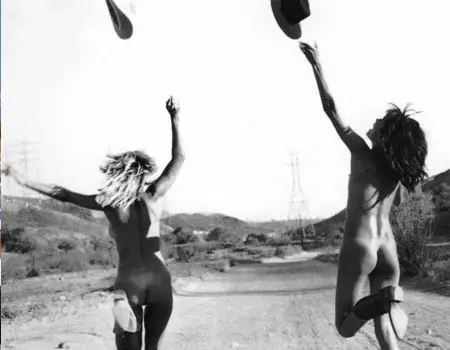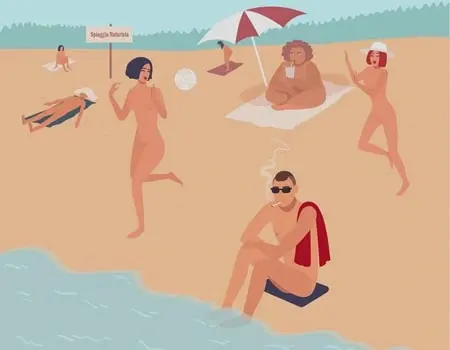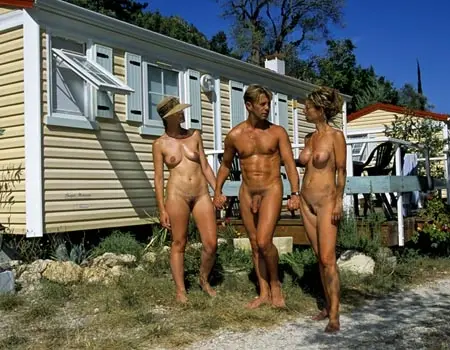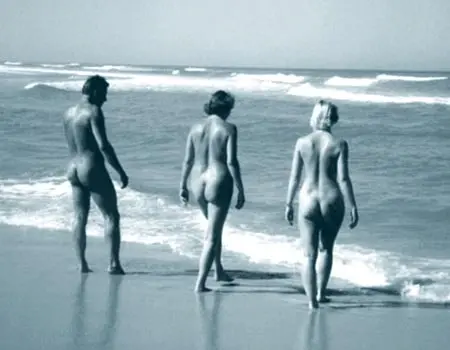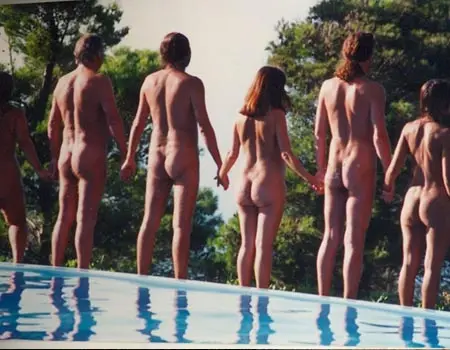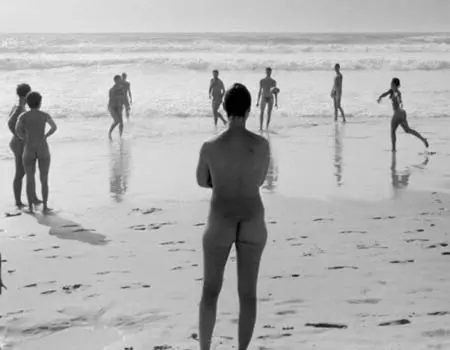Clothing, nudity and naturist mentality
Since ancient times humans have developed the use of clothing as a mask, the same clothing that originally was used as a defense against the elements.
Throughout the ages clothing has been used as an adornment to increase one's appeal or authority, for ritual ceremonies or as an aid in one's work.
In particular in the past few centuries society has developed a cultural dependence on clothing.
Masking oneself in clothes has by and large become a prop to play up or hide one's personality. This cultural dependence then developed veritable codes of communication.
Clothing is often used to build a person s image, an image that might be true, false or presumed. Clothing is used artificially to attempt to build an image of ourselves that we would like to present on the outside and to ourselves. People believe that hiding behind clothing can cover defects they think they have (not only physical but character defects). However, if they deny exposure oftheir true selfto others, they feel mutilated when they are alone.
Above ali they feel that their true personality, but also a sincere relationship of interchange with others, is mutilated.
Therefore clothing becomes a barrier that is not only physical but above ali psychological. Clothing prevents a proper relationship with others and with oneself.
The specific interest of the clothing industry has created a diehard belief clothing is essential to life itself, intrinsic).
Most people believe that dressing is a necessity that goes beyond protection from the elements, beyond practicality, and beyond the various moments of life. In other words, they use clothes even when there is no need.
This mentality, which is fed by the interests of the clothing industry, is accompanied by the inclination of the major religions to automatically associate nudity with sexual activity, and therefore considerate it morally reproachful, dirty, sinful.
Through all of the various injluences, many societies have created laws that make it illegal to go around as nature made us and as nature would like us to go around: simply, normally nude. The creation of these distortions from the natural human state is often caused by fragile selfesteem that is developed at an early age. Children are influenced by an environment that often produces negative attitudes about them.
They are told directly or indirectly that certain behaviors of theirs are not right or cute, or good. They are sinful.
When they become adults they feel the false need to cover up these perceived inadequacies oftheir own personality. How many times have we heard: -Naturism? I have nothing against it, but it 50 not for me.
These adults, who are the majority in the societies we live in and related to create a system of behaviors, norms and beliefs that compensate for, deny, and repress these presumed inadequacies. Moreover, people who are afraid of their inner self often become the most implacable judges of others.
They perceive normality as a lowering of others to their mediocre level: they are the ones who decide if someone is dressed properly for a given occasion.
In their mediocrity, born of the distortions transmitted to them as children, have become the yardstick for everyone else. And they believe it is right because they have always done it that way.
In particular in the past few centuries society has developed a cultural dependence on clothing.
Masking oneself in clothes has by and large become a prop to play up or hide one's personality. This cultural dependence then developed veritable codes of communication.
Clothing is often used to build a person s image, an image that might be true, false or presumed. Clothing is used artificially to attempt to build an image of ourselves that we would like to present on the outside and to ourselves. People believe that hiding behind clothing can cover defects they think they have (not only physical but character defects). However, if they deny exposure oftheir true selfto others, they feel mutilated when they are alone.
Above ali they feel that their true personality, but also a sincere relationship of interchange with others, is mutilated.
Therefore clothing becomes a barrier that is not only physical but above ali psychological. Clothing prevents a proper relationship with others and with oneself.
The specific interest of the clothing industry has created a diehard belief clothing is essential to life itself, intrinsic).
Most people believe that dressing is a necessity that goes beyond protection from the elements, beyond practicality, and beyond the various moments of life. In other words, they use clothes even when there is no need.
This mentality, which is fed by the interests of the clothing industry, is accompanied by the inclination of the major religions to automatically associate nudity with sexual activity, and therefore considerate it morally reproachful, dirty, sinful.
Through all of the various injluences, many societies have created laws that make it illegal to go around as nature made us and as nature would like us to go around: simply, normally nude. The creation of these distortions from the natural human state is often caused by fragile selfesteem that is developed at an early age. Children are influenced by an environment that often produces negative attitudes about them.
They are told directly or indirectly that certain behaviors of theirs are not right or cute, or good. They are sinful.
When they become adults they feel the false need to cover up these perceived inadequacies oftheir own personality. How many times have we heard: -Naturism? I have nothing against it, but it 50 not for me.
These adults, who are the majority in the societies we live in and related to create a system of behaviors, norms and beliefs that compensate for, deny, and repress these presumed inadequacies. Moreover, people who are afraid of their inner self often become the most implacable judges of others.
They perceive normality as a lowering of others to their mediocre level: they are the ones who decide if someone is dressed properly for a given occasion.
In their mediocrity, born of the distortions transmitted to them as children, have become the yardstick for everyone else. And they believe it is right because they have always done it that way.



